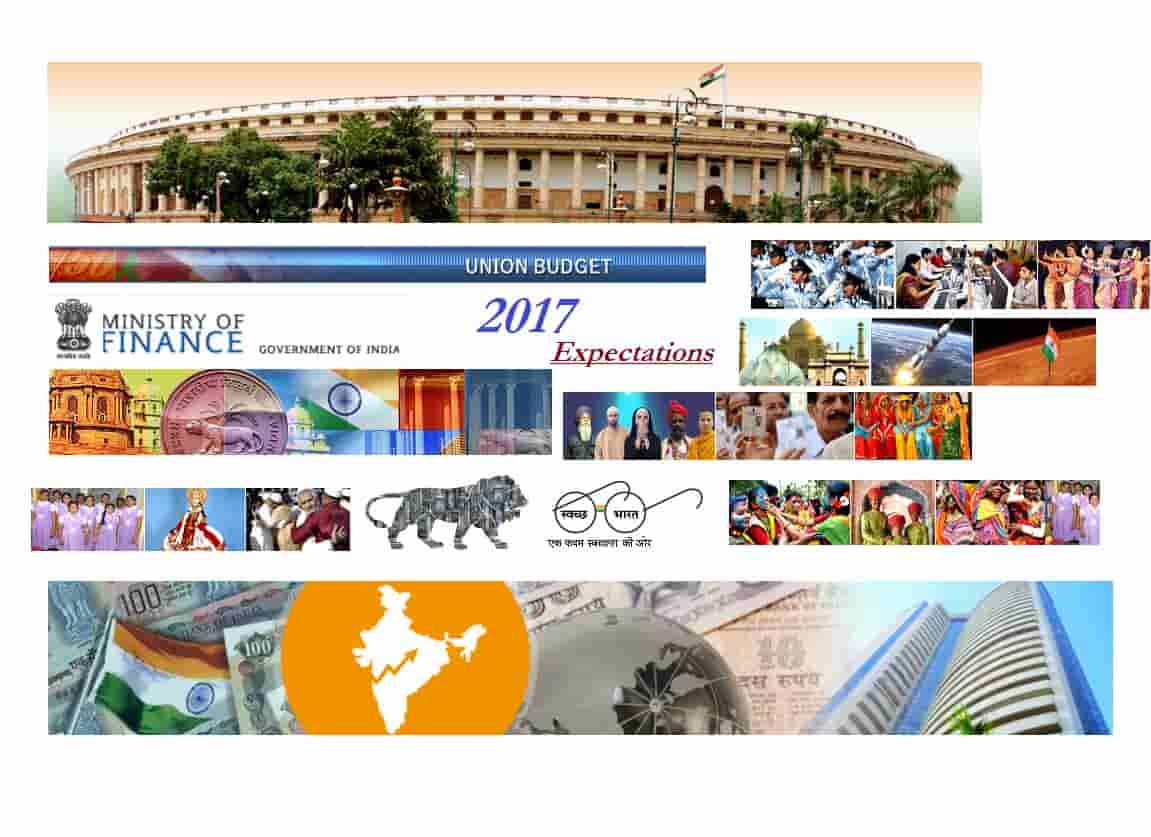India Inc. is looking with great anticipation at the Union Budget 2017 announcement, on February 1, 2017. This is the next major announcement by the Government of India after the recent Demonetization drive and is expected to spell out the policies for the world’s fastest growing economy. Team Estrade spoke to industry leaders, to know their expectations from the Union Budget 2017. This is the third in series of expectations from the Union Budget 2017, brought to our readers as a miniseries, where India Inc.’s business leaders share their concerns and insights.

Hamid Farooqui, CEO – SogoSurvey
Relatively speaking the quality of life in Indian cities is not on par with developed countries. In my opinion the biggest cause for this is very high concentration of population in cities. Again, this is due to lack of enough cities in India. We need to combine accelerated development of smart cities and Startup India program announced by PM Modi. Budget 2017 should allocate major resources towards the development of these cities with private public partnership. Also, provide great incentives to startups to do business from these cities. Provide affordable housing, healthcare, schools and other facilities and infrastructure of international standards. Startups will attract high skilled people to these cities from everywhere. India as a whole would progress and quality of life of Indians would improve. This is a long term strategy and our next generation will thank us for this.
I hope to see some kind of special incentive to Information Technology professionals in this budget. My argument is that we want to encourage more and more students to get into IT so that our leadership position in Global IT business only goes up. Next Google or WhatsApp or Tesla Motors should come out of India. The budget needs to help that. I propose a higher income tax exception for IT professionals.
I know that PM Modi has announced a lot of incentives for startups. In the budget, I would like to see one incentive to be practically implemented immediately for startups, i.e., GST exemption. If the company has already been in operation for less than 3 years then 3 years exemption starting 2017.

Prakash Tulsiani, ED & COO – Allcargo Logistics Ltd.
While there is a wish list of reforms that the sector deserves, a few points need to be considered on priority. At the outset, GST implementation is key for ease in movement of goods in the domestic market, the benefits of which are well discussed in the recent past. Secondly, focus on provisioning for infrastructure development, including better transportation system that will improve business efficiencies, thereby benefiting the sector immensely. The government should also look at fast tracking approvals for new infrastructure projects to boost foreign investors’ confidence.
The government should consider giving tax benefits for capital intensive infrastructure. This will incentivize the private sector to invest significantly in infrastructure projects, a positive step towards realizing the ‘Make in India’ motto of the government. The development of logistics parks across the country for speedy delivery is also the need of the hour. Logistics parks will help provide services and facilities to reduce costs, boost efficiency and improve the flow of both raw material procurement and finished goods.
The sector is also in need of skilled labour. The government should look at allocating funds for education and skill development in this area as this will be of great help to all logistics players.
With the current demonetization move, the industry and the common man at large have high expectations of lowering tax rates and reviving positive sentiments in the economy.
Besides, it would be interesting to see what the budget has in store to boost the manufacturing sector and pump up the rural economy. Reforms in this direction are a ready welcome for the logistics industry.”

Saurabh Kocchar, CEO – foodpanda India
The year 2016 has witnessed one of the boldest economic decision of demonetization by the Government of India. The move has acted as a catalyst in transitioning India from a cash based to a cashless economy with continued impetus on Digital India initiative of the government. There has also been a great shift in the buying habits of the Indian consumer, and the online transactions have witnessed a great surge in the last one year. With robust investments in making the digital landscape more strong and its consequent implication with respect to quality and customer experience, we have observed that consumers are turning more and more to online space for their everyday needs. Food is also not far behind. Consumers are looking at digitization, not just in terms of menus but also for discovering food. The greatly increased use of smartphones, technological innovations and the rising complexity of decision-making due to the proliferation of products and points of sale are key areas of change that have impacted consumer and retail businesses. Food tech industry is touted to be a $50 billion market, growing at 16 per cent YOY. This growth can largely be attributed to the direction that the last year’s budget provided to the ecosystem. Similarly this year, we are looking forward to a growth-oriented budget that addresses the gaps in digitization and sets path for a digital economy where food tech is also an important component.”

Ajay Laddha, Co Founder – YMS Mobitech Pvt Ltd
The India consumption story, especially the sectors dealing in cash, faced a small roadblock when the government announced its demonetization move in November. We think the Finance Minister will try and reverse the negative sentiment with his Budget speech. While demand has been sharply hit, we are expecting a sharp recovery in the next couple of months. The Budget may look to aid consumption by tinkering with personal income tax. We are also expecting incentives for e-payments and digital transactions, improving the share of retail business, hitting the grey market and leading to higher acceptance for e-based offline distribution.

Ashok Vashist- CEO,Founder, Aaveg- End to end corporate mobility provider
While India’s startup ecosystem presumably continues to develop at a rapid pace, the exit options for investors remain bleak. In its bid to further simulate the country’s startup ecosystem, the government has rolled out a number of ambitious projects – Startup India, Make in India, Digital India and Skill India – as it looks to drive sustainable economic growth and generate large-scale employment in Asia’s third-largest economy.
Investors are investing in India to multiply their investment. They do not have a social agenda. To ensure strong financial returns for investors coupled with economic growth, the government needs to:
- Upgrade Infrastructure in line with global standards
- Ensure fair and uniform taxation policies and enforcement
- Provide Equal opportunities for large and small businesses
- Government in India is a big buyer of products and services as well. Current government procurement policies are biased in favour of large suppliers. The budget needs to correct this bias.
- Promote Indian Services industry globally

Murali Ramalingam, Country Head- Ixia Technologies.
As we are moving swiftly towards digitization, cyber security has become one of the biggest concerns of enterprises and Government. Minimal IT budgets and lack of skilled resources to combat cyber security threats can ultimately cost organizations millions. The Government needs to allocate sufficient budget, time and focus to strengthening cyber security in parallel with the growing volume of digital transactions that are taking place in the country

Dharmesh Jain, President, MCHI-CREDAI & CMD, Nirmal lifestyle.
The Government of India’s objective to achieve the goals under the ‘Housing for All by 2022’ Scheme is one of the landmark schemes under the dynamic leadership of our Hon’ble Prime Minister, Shri Narendra Modi.
An estimated housing stock of 2 crore new houses is aimed by the Government under this noble scheme. The government needs private players to ensure the creation of more than 2 crore new homes in the next 5 years. The government also needs private players for good quality homes.
Hence, it is important that the government makes certain re-alignments in this scheme along with certain other measures that would ensure the success of this initiative, for the larger good of the masses.
For Starters, we expect Budget 2017 to be a big stimulant for Real-Estate Sector considering the direct impact of demonetization and indirect impact of dormant market sentiments. Post radical financial reforms, Tax reforms & rationalization are need of the hour and will act as confidence boosters if tax deduction limits are substantially raised under 80 C and for first time home – buyers which is currently insufficient. Separate deduction for principal component of home loan will certainly boost the sentiments which is currently clubbed with other instruments under 80-C which are primarily small savings & insurance driven.
Under Section 24 – D interest rate is capped at Rs. 2 Lakhs which is insufficient and should be raised to at least Rs. 5 Lakhs for first five years as interest component is very high during this period. Alternatively, home buyers should be able to claim full rebate under 24-D for loan against property value of Rs. 50 Lakhs. As for Section 54-F, exemptions from Capital Gains in case of investment in residential house, the 2014 Finance Act amended the section 54F to restrict the exemption only for investment in one residential house within India. Why restrict the exemption to one? This restriction results into undue hardship to the assesses even in cases where the investment is genuine. Amendment in this section will encourage home buyers to invest in the real estate and increase the demand and will also enable industry to crystallize the vision of Government of “Housing for All” by 2022.
We suggest a few amendments in the Scheme of Housing for All that would have a greater impact and would act as a catalyst in achieving the set targets under the said scheme.
- We suggest revision to the definition of Residential Unit for affordable housing, which is currently at 30 sq.mtrs. area in metro and 60 sq.mtrs. in non-metro, our suggestion is to revise the same to 60 sq.mtrs. carpet in metro and 90 sq.mtrs. carpet area in non-metro.
- Since the last budget, tax relief was given on interest payment on home loans if the property bought or under construction is completed within 5 years from the end of financial year in which the loan has been availed. In view of the same the timeline for completion of an affordable housing project should be raised from 3 years to 5 years under the said scheme.
- At present under the Scheme, Service Tax exemption on all affordable housing projects as defined under the Act. We recommend that GST exemption on all affordable housing projects as defined under the act.
- We also suggest that for the housing cost of Rs. 50 lacs the loan amount should be raised to an amount of Rs. 40 lacs (as against Rs. 35 lacs, at present, under the scheme).
- We suggest that the additional interest deduction of Rs. 2,00,000/- to buyer towards interest on loan. This amount is over and above the deduction of Rs. 2 lacks u/s 24 under ‘Income from house property’. This will give a major thrust and boost to the development of smart cities across India, this will also positively transform and urbanize tier II and tier II cities. A higher limit of interest exemption will accelerate the demand for housing in this segment and thereby bridge the gap between the current demand and government vision.
- Lastly, affordable housing falling under Section 801BA is recommended to be classified under infrastructure industry.

Jyothi Gosala, Director – Shubang Communications Pvt. Ltd
Hon’ble PM Shri Narendra Modi had promised “minimum government and maximum governance”. But with allocations to the jobs guarantee scheme at their highest ever level, this promise has gone out of the window, at least for now. He is a better marketer though than Mr Singh and his regime is not seen to be as corrupt as the previous government.
Further, what India needs is the creation of a huge number of jobs – two years ago, Mr Modi had promised 10 million jobs. What this tells us is that there is huge over-employment in an unproductive sector and that jobs need to be created in other sectors so that people can move away from agriculture. And that is clearly not happening. Skilling is a good initiative started by the Modi Govt apart from creating entrepreneurial cells through innovation drives.
Only some 30 millions Indians work in the organised sector. And nearly 58% of its population continues to be dependent on agriculture which generates around 16-18% of India’s GDP.
What this tells us is that there is huge over-employment in an unproductive sector and that jobs need to be created in other sectors so that people can move away from agriculture. And that is clearly not happening. PM Narendra Modi’s government should unveil a business-friendly budget aimed at attracting greater investment for the economy.
India’s Goods & Services Tax, was “good economics, but demonetisation is not” The government hopes this will bring cash worth billions of dollars in unaccounted wealth back into the economy. The two notes accounted for more than four-fifths of the currency in circulation. This move will achieve what it needs without damaging the economy.
India Inc. Union Budget 2017 Expectations: Part III






